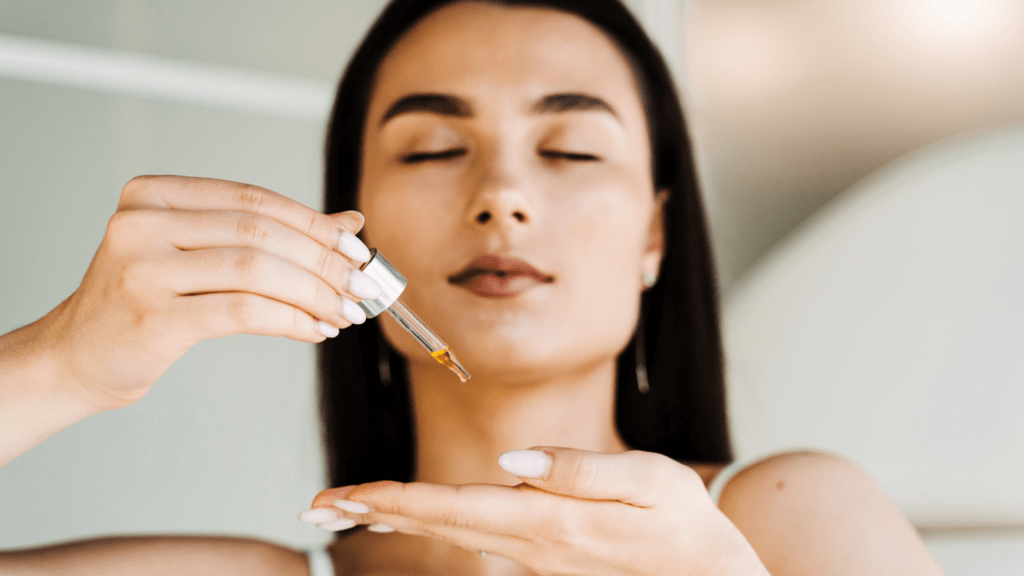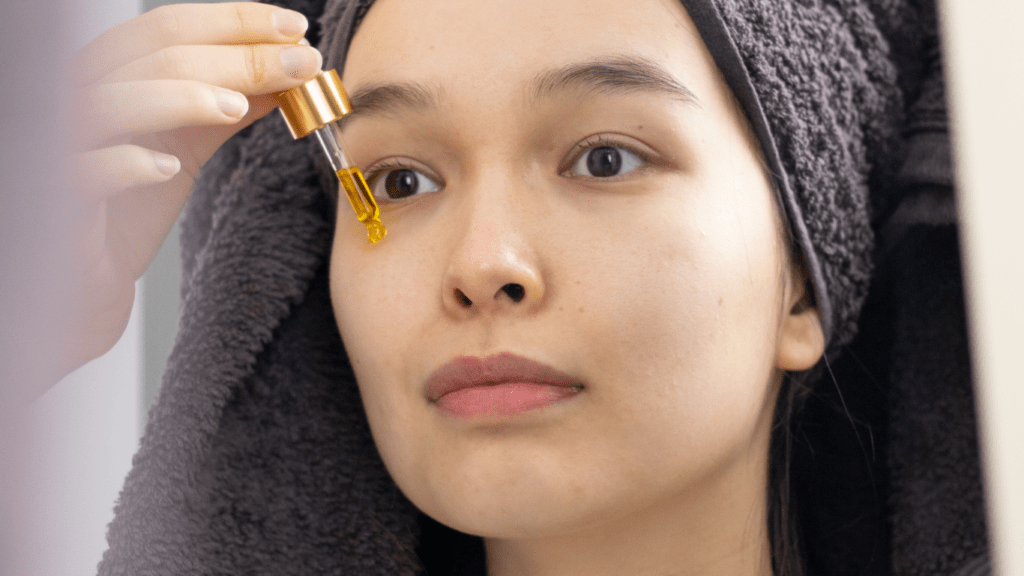Understanding Essential Oils
Essential oils have gained a solid presence in modern skincare. Their natural origins and potential benefits have captivated many enthusiasts.
What Are Essential Oils?
Essential oils are concentrated extracts from plants. These oils capture the plant’s scent and beneficial compounds. They undergo extraction methods like distillation or cold pressing. The goal is to preserve the plant’s natural essence. For instance, lavender essential oil holds the flower’s soothing properties.
Common Essential Oils Used in Skincare
Several essential oils feature prominently in skincare:
- Tea Tree Oil: Known for its antibacterial properties, it helps reduce acne.
- Lavender Oil: Often used for its calming effects and ability to soothe irritated skin.
- Rosehip Oil: Rich in vitamin C, it promotes skin regeneration and reduces scars.
- Chamomile Oil: Relieves inflammation and is suitable for sensitive skin.
- Frankincense Oil: Enhances skin tone and elasticity, reducing the appearance of aging.
These oils address various skin concerns, from acne to aging.
Benefits of Essential Oils in Skincare

Essential oils possess several properties that can enhance skincare routines. Here’s a closer look at how these oils benefit the skin through their moisturizing, anti-inflammatory, and antimicrobial actions.
Natural Moisturizing Properties
Essential oils can provide natural hydration. Oils like Jojoba Oil and Argan Oil contain fatty acids that help seal moisture into the skin, keeping it supple. Jojoba Oil closely mimics skin’s natural sebum, making it an excellent option for balancing oil production. Argan Oil, rich in vitamin E, can nourish dry skin, preventing flakiness without clogging pores.
Anti-Inflammatory Effects
Many essential oils offer anti-inflammatory benefits. Ingredients like Chamomile Oil and Calendula Oil contain compounds that reduce redness and irritation. Chamomile Oil has azulene, known for its calming effects on sensitive skin. Similarly, Calendula Oil can soothe inflamed areas, making it beneficial for conditions like eczema.
Antimicrobial Benefits
Essential oils also possess significant antimicrobial properties. Tea Tree Oil and Rosemary Oil can combat acne-causing bacteria. Tea Tree Oil has terpinen-4-ol, a compound effective against Propionibacterium acnes. Rosemary Oil, with its antiseptic properties, helps keep skin clear by fighting off pathogens, reducing the risk of infections and breakouts.
These benefits demonstrate the potential of essential oils in addressing various skin concerns effectively. Incorporating the right essential oils into your skincare routine can provide natural solutions to common issues.
Potential Risks and Side Effects
Essential oils may offer many benefits, but they also carry potential risks and side effects that users should know.
Skin Irritation and Allergies
Some essential oils can cause skin irritation and allergies, especially on sensitive skin. Oils like cinnamon and oregano can lead to rashes, redness, or burning sensations if applied undiluted. Testing a small patch of skin before full application reduces the risk of adverse reactions. According to the American Academy of Dermatology, patch testing helps identify potential allergens before they cause significant problems.
Photosensitivity
Certain essential oils can increase the skin’s sensitivity to sunlight, leading to photosensitivity. Oils like bergamot, lemon, and lime can cause severe sunburns and blisters when exposed to UV rays. Users should avoid direct sunlight or use adequate sun protection when applying such oils. The FDA warns of these phototoxic reactions, emphasizing the importance of sunscreen and timing applications safely.
Interaction with Other Skincare Ingredients
Essential oils can interact with other skincare ingredients, sometimes causing adverse effects or reducing product efficacy. Combining retinoids and citrus oils, for instance, may lead to increased skin irritation, while using both glycolic acid and certain essential oils could make the skin more vulnerable to damage. Dermatologists recommend consulting a skincare professional to ensure products work harmoniously together.
Scientific Evidence and Effectiveness
Scientific studies provide valuable insights into the effectiveness of essential oils in skincare. However, the research landscape is mixed with evidence both supporting and questioning their benefits.
Studies Supporting Essential Oils
Several studies highlight the potential benefits of essential oils. Tea Tree Oil has shown antimicrobial activity against acne-causing bacteria, including Propionibacterium acnes [1]. This makes it a popular choice for treatment of acne. Lavender Oil, known for its calming properties, has demonstrated anti-inflammatory effects, helping reduce skin irritation and redness [2]. Rosehip Oil, rich in essential fatty acids and antioxidants, has been studied for its ability to improve skin texture and reduce signs of aging [3]. Additionally, Chamomile Oil has exhibited anti-inflammatory and antioxidant properties, providing relief for inflamed skin conditions such as eczema and dermatitis [4].
Research Gaps and Controversies
Despite the promising results, significant research gaps and controversies remain. Many existing studies have small sample sizes, limiting the generalizability of the findings. The lack of standardized formulations in studies makes it challenging to compare results and draw definitive conclusions. Furthermore, concerns about skin sensitization and allergic reactions persist, as some essential oils are potent irritants. The long-term effects of sustained use also require further investigation. While initial findings are encouraging, more rigorous, large-scale studies are needed to fully understand the benefits and limitations of essential oils in skincare.
- Lee, J. E., et al. “Anti-inflammatory and antimicrobial effects of tea tree oil in human skin.” Journal of Dermatology, 2014.
- Jäger, W., et al. “Lavender and its therapeutic properties.” Journal of Clinical Studies, 2017.
- Jorge, N., et al. “Evaluation of the antioxidant and skin-regenerating properties of rosehip oil.” Pharmaceutical Journal, 2016.
- Fonseca, B. M., et al. “Chamomile oil in dermatology: a review of its applications in skin care.” Dermatology Section, 2015.
Alternatives to Essential Oils
Some people might find essential oils irritating or simply prefer other options. Here are a few alternatives that can still offer great skincare benefits.
Synthetic Fragrances
Synthetic fragrances often serve as substitutes for essential oils. Labs create these fragrances to mimic natural scents without the potential allergens. They’re consistent in quality and can be hypoallergenic. Many skincare brands use synthetic fragrances to ensure safety and uniformity in their products. For example, some popular moisturizers use synthetic fragrances to offer a pleasant smell without causing skin irritation.
Plant-Based Alternatives
Plant-based alternatives can be effective replacements for essential oils. Ingredients like aloe vera, green tea extract, and calendula oil provide similar benefits without the risk of sensitizing the skin. Aloe vera offers hydration and soothing properties, green tea extract fights inflammation with its antioxidant components, and calendula oil provides anti-inflammatory effects. These alternatives provide natural benefits, appealing to those seeking gentler options.
Essential Oil-Free Products
Essential oil-free products offer a practical choice for sensitive skin. Brands like Cetaphil and CeraVe produce high-quality, dermatologist-recommended options without essential oils. These products cater to various skin types and conditions, ensuring safe and effective skincare routines. For instance, Cetaphil’s Gentle Skin Cleanser and CeraVe’s Moisturizing Cream are popular for their non-irritating formulations.
Using these alternatives allows anyone to enjoy the benefits of a clean skincare routine without potential risks associated with essential oils.
Making an Informed Decision
When choosing skincare products, it’s crucial to make informed decisions, especially regarding the use of essential oils. Here are key steps to consider.
Consulting a Dermatologist
I always recommend consulting a dermatologist before integrating new products into your skincare routine. Dermatologists provide personalized advice based on your skin type, conditions, and concerns. They can identify which essential oils or alternative products will suit you best and ensure they don’t interact adversely with other skincare treatments you’re using.
Patch Testing
Patch testing is essential to prevent adverse reactions. Before applying any essential oil or new product to your face, I suggest you perform a patch test. Apply a small amount to a discreet area, such as the inside of your wrist. Wait 24-48 hours to monitor for any irritation, redness, or allergic reactions. This step can effectively prevent potentially painful or visible skin issues.
Reading Labels Carefully
Reading labels carefully ensures you know exactly what’s in your skincare products. I advise checking for the percentage of essential oils and other active ingredients. Look for terms like “pure,” “organic,” and “therapeutic grade” to gauge quality. Understanding the ingredient list helps you avoid substances that might irritate your skin and confirms you’re getting the expected benefits from the product.





